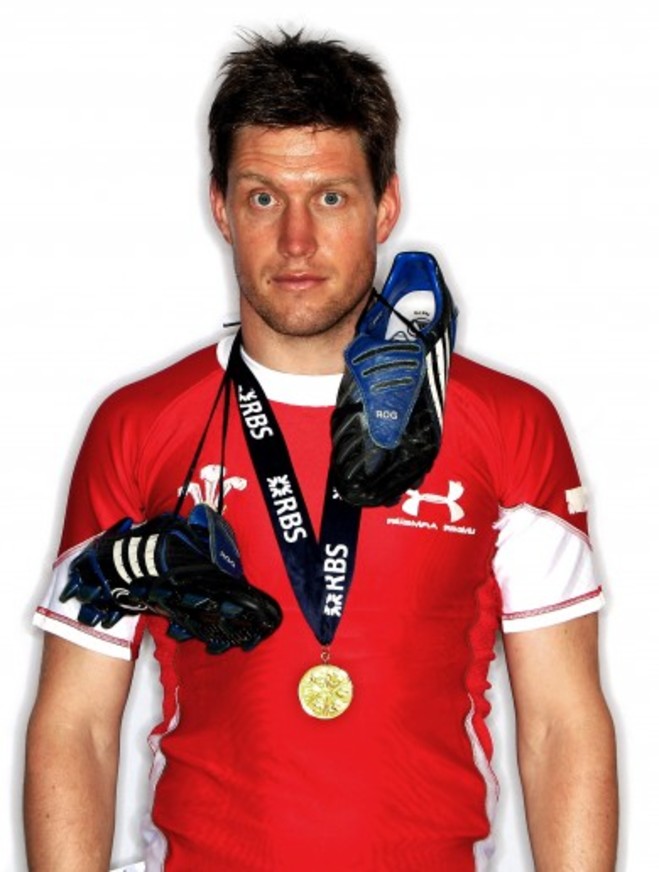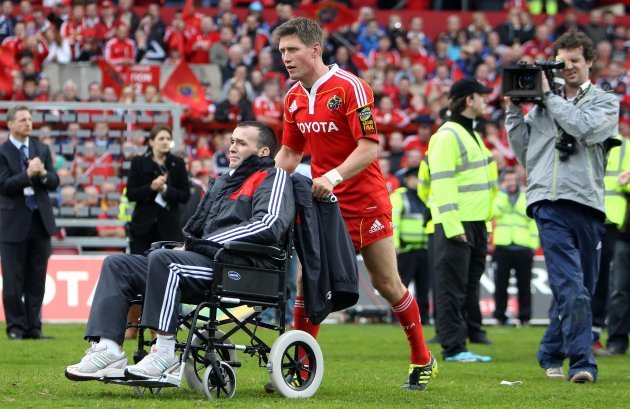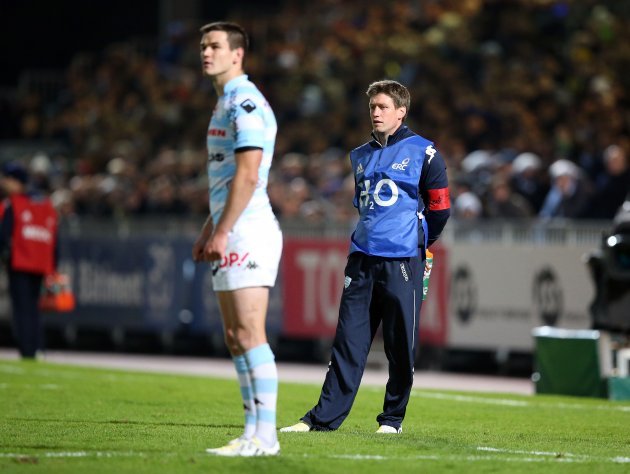ONE THING WAS certain before the Ronan O’Gara documentary, ‘ROG‘, was unleashed on RTE One on Thursday night, finding words other than ‘honest’ to describe it was going to be difficult.
Little wonder. Over the years O’Gara has always assured straight-talking as a minimum. So when he agreed to allow a documentary chart the final chapter in his playing career, the legendary Munster and Ireland number 10 was only ever going to become even more frank.
Dave Berry and Nathan Nugent have spent the past four years watching O’Gara work from close proximity. ‘ROG’, though, differs from the normal documentary in a number of ways.
Firstly; Berry and Nugent did not have to waste any filming time building up a trust with their subject, it already existed. The co-directors are the men who brought you the previous behind-the-scenes looks at the Irish rugby camp; from Final Words, Triple Crown (2004), Reaching for Glory - when Berry gained access to the dressing room for the 2007 season – and Ireland’s Grand Slam Journey (2009). In that time the pair ran an idea past O’Gara and the rest is television history.
Perhaps it is fitting that an O’Gara film has divided opinion. Indeed, even O’Gara himself expressed some discontent in his Irish Examiner column yesterday, saying his enjoyment of the sport had not come across as clearly as it could have. Of the criticisms that arose from the wider public during and in the immediate aftermath of Thursday night, most revolved around the omissions. The feeling is almost mutual with the filmmakers:
“Keeping it down to 78 minutes,” says Berry when asked about the biggest challenge of the film.
“Keeping it focused on the latter part of his career. The Heineken Cup final in 2008 is just a three-second shot, for the Grand Slam there’s about five seconds, then on top of that we had whole sections on Paul Darbyshire, the Lions, and summer tours… a whole load.
“But when you do anything like this, it’s like writing a book: sometimes you have to leave chapters out to let it flow. That’s what Nathan Nugent did brilliantly. These parts might be 10 seconds long, but they add up and up and up.”
©INPHO/Dan Sheridan
Nugent also laments the omission of a touching segment on Darbyshire – the Munster fitness coach who suffered with motor neurone disease and died in 2011 – along with moments when the retired O’Gara revealed hand-written letters of admiration from Leinster players whom he would never have counted as close friends (perhaps the opposite) as a player. The co-director also happily accepts what he says are ‘absolutely valid’ criticisms of the way the story is knitted together without being tied to the raw chronology.
“When we started editing it two years ago, a couple of people pointed out that the real story was that we had come to him towards the end of his career.
“In many ways the Munster story has been told several times in other really good documentaries and he was such a part of that that we felt we were just repeating ourselves. What we really wanted to do was single out what was unique about this, but at the same time keep a flavour of the man himself.
“The main story was from 2009 up to when he retired. We had to acknowledge his past, but if we had just gone back and started at the beginning it would have been a three-hour documentary.”
Many probably wouldn’t have complained had that 180-minute epic been the appointment viewing that lay in store for them on Thursday, but the shop window of RTE One in prime time at the tail end of the Christmas schedule has its own constraints.
“For TV you always have to build to a certain point,” explains Nugent, “then make room for an ad break and then build up to another point. If that documentary had just played as a feature length it would have had a very different feel to it.”
The content is now there at RTE’s disposal should they wish to fill a Blu-Ray disc with hours and hours of extras. For now, though, the film exists as a snappy, focused piece of work trained on the closing chapters of one of Ireland’s greatest ever rugby players.
Of course, those last few pages of the O’Gara story were made turn all the faster by the arrival of Jonathan Sexton on the international scene. in 2010, under the stand in Stade Mayol, O’Gara had confided with Nugent, Berry and their camera that he was ready to give up the game he loved. However, with a year to still to run on his contract and a World Cup in the offing, the pair fancied he might take a rare backward step once he had a chance to shower and change out of his work clothes. When O’Gara did decide to retire last year, neither Berry nor Nugent had any more forewarning than the rest of the world.
“Okay, we’ve got a finish here,” thought Berry when the Adidas boots were hung up. But the story had a twist. The story had an epilogue.
©INPHO/Dan Sheridan
The relationship between, the once rival, O’Gara and Sexton frames the film’s story arc: from O’Gara’s insistence that there could be no comparison between the pair in 2009; to 2013 when he is seeing more and more of himself in the man sitting in the back seat of his car.
Some viewers had their tongue firmly in their cheek when calling that element a great modern love story, but you only need look at the treatment of Sexton from the O’Gara children from ‘Jonny’s wearing your jersey’ to happily poking him with a toy sword (the true mark of acceptance into a family) to know that this Bromance is sincere.
Throughout the story, another aspect makes this film different from your average sportsman’s documentary.Two extensive interviews with O’Gara form the basis of the content. From there, there are shorter snippets when either Berry, Nugent or both caught up with him for a word on the sidelines or in a hotel room. Yet there is no voiceover, no talking heads or rent-a-quotes wheeled up to say what a great man he is and shuffle off again.
He may have never been feted for his voice projection, but Ronan O’Gara has never needed anybody to talk for him, so the directors let him speak for himself.
“You’re listening to Ronan O’Gara for the guts of 80 minutes and we never got him to link one section to the next,” Berry says with the voice of a man who’s achieved something he once thought a little crazy.
“Yeah, there’s the odd bit of commentary and the news reports post World Cup, but that’s the craft of Nathan Nugent. He just has an amazing ability to let it flow. For me, the thing I’m most proud of is that it’s just the one voice.”
“It was a real challenge,” says Nugent. “Normally in any documentary some people shine because you take the best of what they say and reinforce it through the words of other people to make a bit of light and shade. It put an awful lot of weight on just his voice. So he had to deliver.”
Once again O’Gara has managed to come up with the goods. In a week where RTE’s documentary department has surpassed itself with films on Donal Walsh and tomorrow’s The Summit, ‘ROG’ more than holds its own – though, as O’Gara points out, the concerns of a sportsman are cast into a harsh light by the Donal Walsh documentary that aired 24 hours previously.
Savagery
Those who disliked it on first viewing will not be easily swayed, but Nugent and Berry have made clear this should not be viewed as an encyclopedic work on the career, life and times of Ronan O’Gara. This is a film for people who already know the source material, who know the tries and trials that did not make the cut. The people who know that incidents such as the savagery of Duncan McCrae could not be covered better than the blood-spattered Living With Lions, but who might still feel like they know ROG just a little bit better by the time the closing montage starts to roll.
“I wouldn’t dare to suggest I know the guy, even still,” says Nugent, acknowledging there are still layers to be found in O’Gara’s character even after 10 years spent in his wake.
“Shooting and interviewing him over the course of four years, he was always available to talk to us, always eager. He never once said, no he won’t talk to us. Or; ‘ah, listen lads, I’m not in the mood.’ He was always open to us and that was what helped bring forward all these little nuggets.”
“A great guy,” comes Berry’s assessment. “If he has your trust he has your back. Any player we were there with just has nothing but absolute respect for him. He’s committed, he’s honest – he’s a perfect family man.”



